|
Bad grades. Behavior problems at school. Curfew violations. These are just a few of the problems many parents have to navigate as their children become teenagers.
How are you handling these situations in your house? Lots of yelling, grounding and taking phones? I bet you're tired. Frustrated. Unsure of what to do next. What if I told you there is a better way? If you're looking for tips on how to handle these problems once and for all, then you're in the right place. This e-book was written JUST FOR YOU! Click below to access your free copy of my e-book: How Not to Start an Argument with Your Teen OR What to Say When. Start experiencing more peace, quiet, happiness and success in your home today! Many people who experience stress and anxiety are not sure where to start to begin coping with these feelings. Can you relate? Below you will find a worksheet to help you start building up your "toolbox" of coping skills. This exercise can be useful for people of any age and place in life, including adults, parents, teens and even younger children. I'd love your feedback once you have completed the worksheet and given your new coping skills a try. Please leave a comment below or reach out to me directly! Download the PDF version of the worksheet here:
*Please note: This worksheet and its contents should not be used in place of professional help. If you are experiencing unmanageable levels of stress and anxiety, notify your physician immediately. If you are having thoughts of homicide or suicide, please call 911 or go to your nearest emergency room. Bethany Raab is a Licensed Clinical Social Worker in Denver, Colorado.
She is dedicated to helping teens and families be happy and healthy! 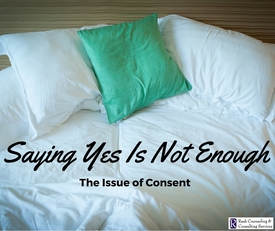 Have you had chance to talk to your teen about the definition of consent for sexual activity? If so, what did you learn? If not, what is keeping you from asking? In case you missed it, check out part one of this post to learn more: The #1 Parenting Mistake You Don't Know You're Making. When I ask teen clients about what consenting to sex means, I typically get one of two answers.
The truth is, simply saying yes to sex is not enough. Making an assumption that you know what the other person wants is definitely not enough. Keep reading to learn more about all of the aspects of giving true, informed consent to sexual activity.*
Now is the time to start talking with your teen about consent. If you don’t, who will? *This blog post is meant to be purely informational. The writer is not able to provide legal advice or instruction in anyway. Questions about specific examples will not be answered in the comments. Please contact an attorney if you have questions or concerns. Bethany Raab is a Licensed Clinical Social Worker in Denver, Colorado.
She is dedicated to helping teens and families be happy and healthy!  If you are like many parents, you are starkly aware of your imperfections when it comes to raising your children. You may have looked at this article with a combination of curiosity and dread. Rest easy. I am not here to tell you what you’re doing wrong – you don’t need that from me. What I do want to talk about is an issue many parents avoid addressing with their children. As kids grow, they become increasingly aware of their own bodies. They also pay more attention to others’ bodies and the presence of sexual images. These are cues that it is time for the “sex talk.” Some parents choose to let the school tackle sex ed. Other parents venture into this topic themselves. The longer I work with teens, it becomes more and more obvious that one specific issue is consistently left out of their sexual education, whether at home, school or both. The issue of consent. What do you think giving consent for sex entails? What do you think your teen knows about giving consent for sex? Ask them, and then come back to learn more: Saying yes to sex is not enough. Bethany Raab is a Licensed Clinical Social Worker in Denver, Colorado.
She is dedicated to helping teens and families be happy and healthy! Start writing with your teen! Directions and prompts are all included on this three page document, created just for YOU and your family! Read about the difference between diaries and journals: Journaling: Different Than a Diary Get 10 more prompts to write about with your teen: 10 Journal Prompts for Teens and Parents Scroll down to download a PDF of this great list!
Bethany Raab is a Licensed Clinical Social Worker in Denver, Colorado.
She is dedicated to helping teens and families be happy and healthy! 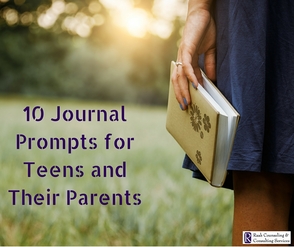 Need a new way to communicate with your teen? One of the neatest tools I have come across in my years as a teen therapist is a journal specifically made for adolescent girls and their mothers. It is a “back and forth” style book to help young women connect in a meaningful way with their mom. The thing is... not every teen girl has an involved mother, and not every mother has a teen daughter. Plus, boys and fathers are left out of this activity entirely! Below you will find ten journal prompts to share with your teenage son or daughter. These are a mix of fun/silly topics and more serious, thought-provoking prompts. First, choose a book or notebook that you will share. (You can also type documents on a computer, but give the handwritten journal a try first!) Pick a pen to keep with your journal. Agree on a safe place to leave the book for the other to read. It is important that both of you agree that what is written is private and not to be shared without the other person's permission. Okay! Now you're all set! Click below to access TEN prompts to get you writing!
Like this? Click here for a year-long set of journal prompts for teens and their parents! Want to begin writing in your own journal? Go here to get started: Journaling: Different Than a Diary Bethany Raab is a Licensed Clinical Social Worker in Denver, Colorado.
She is dedicated to helping teens and families be happy and healthy! 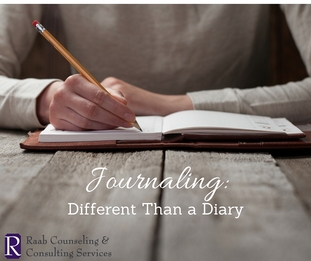 The word DIARY takes me back to my childhood. I wrote in a diary off and on for many years. Those books, pretty things adorned with cheap locks, are now gone. Still, I remember them vividly. I wrote about the day-to-day events of my life. My childhood pet, school projects, friends and the names of my crushes all found a home in my diary. My diaries were dear to me. They were carefully protected from prying eyes. Looking back, these books played a significant role in my daily and weekly routine as a child and as a teen. I wrote down events I did not want to forget. These days, I still write, though not as often as I did as a younger person. The habit of writing down daily details and special events is difficult for me to prioritize in my schedule. It simply does not happen on a regular basis. The kind of writing I do more frequently sounds similar, but it is not the same. I journal. How is journaling different than keeping a diary? Simply put, a diary is a record of events. A journal is writing with the purpose of reflection and growth. Keeping a journal is more personal and requires more vulnerability than a diary. A quick Google search will show you that journaling is not only popular, but also beneficial. It is useful as a way to help manage stress, anxiety, depression and grief. It is a tool often used in counseling to help people gain a better understanding of their struggles and their strengths. Where do I start to help my child or teen gain the benefits of journaling? Start with yourself. Get some paper, a notebook or a computer in front of you and start writing. Your experience with journaling can help inspire your teen to do the same. In the meantime, here are three prompts to get you started:
Ready for more? Check out my other posts about journaling. One includes a year's worth of journaling prompts! 10 Journal Prompts for Teens and Parents 52 Journal Prompts to Help You Connect with Your Teen This Year! Bethany Raab is a Licensed Clinical Social Worker in Denver, Colorado.
She is dedicated to helping teens and families be happy and healthy! Bethany Raab is a Licensed Clinical Social Worker in Denver, Colorado.
She is dedicated to helping teens and families be happy and healthy! Raab Counseling & Consulting Services is now accepting new clients with Denver County Medicaid Coverage through Access Behavioral Care (Colorado Access). I am happy to consult with young adults and families of teens who are covered by Denver Medicaid. I will work only with clients whose needs are within my scope of expertise. Additional resources will be provided to those whose needs I cannot meet. Click here to see the types of clients with whom I typically work! I am thrilled to begin this new journey in my therapy practice. Please spread the word. Do not hesitate to contact me with any questions! Bethany Raab is a Licensed Clinical Social Worker in Denver, Colorado.
She is dedicated to helping teens and families be happy and healthy!
At their core, teens want to be heard. Give them opportunities to talk to you and be interested in who they are becoming. Be consistent in your efforts. Also, understand that sometimes they may need some space before opening up. I want to hear from you! Please share your ideas and stories about communicating with teens! Bethany Raab is a Licensed Clinical Social Worker in Denver, Colorado.
She is dedicated to helping teens and families be happy and healthy! |
Welcome!
Every blog post you see on this page is written especially for teens and their parents! Like it? Pin it!
Follow me!
Categories
All
|
||||||||||||||||||||
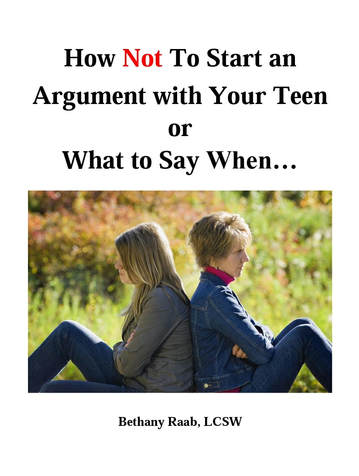
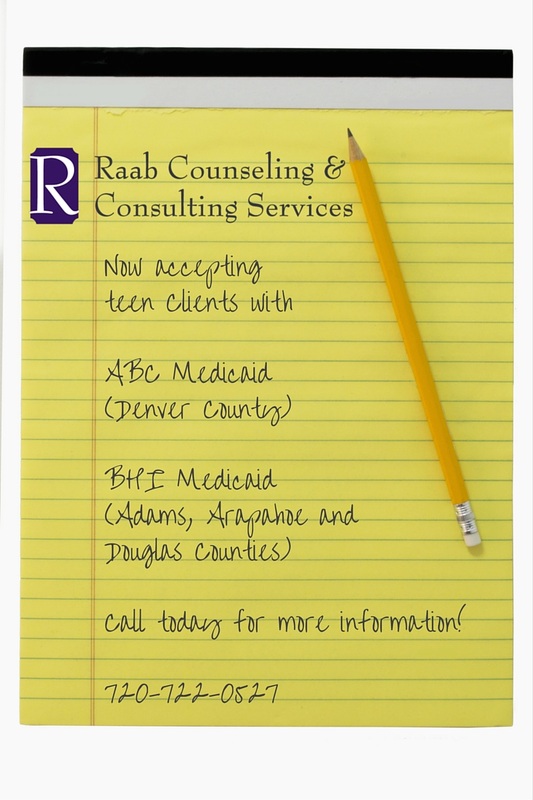
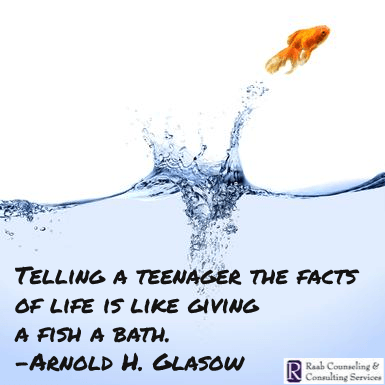

 RSS Feed
RSS Feed